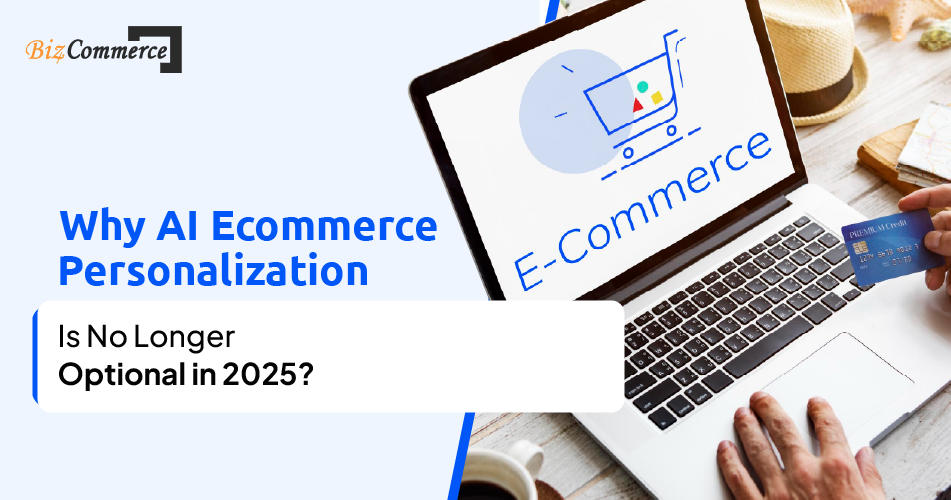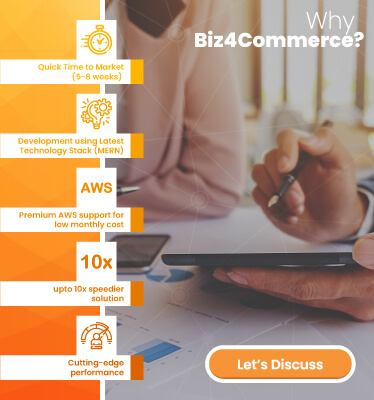Why AI Ecommerce Personalization Is No Longer Optional in 2025?
If your online store still greets every visitor with the same layout, same product grid, and the same 'best sellers' list—congrats, you just became forgettable. In 2025, personalization isn’t a feature. It’s the entry ticket.
Welcome to the era of AI ecommerce personalization—where every click, scroll, and pause is an opportunity to deliver something tailor-made for your customers. In 2025, personalization isn’t just a conversion booster—it’s the baseline. The brands that win are the ones that use data smartly and act on it instantly.
From predictive product recommendations to individualized offers, ecommerce is evolving from “Hey, here’s a deal!” to “Hey [Customer’s Name], here’s what you’ll love.” This evolution is largely driven by advancements in AI—machine learning models that continuously analyze behavior, predict needs, and adapt content on the fly.
And none of this would be possible without the rise of intelligent solutions from companies that specialize in this space. As a seasoned AI development company, we’ve seen firsthand how AI is reshaping ecommerce across industries.
In this blog, we’ll break down what AI ecommerce personalization really means, how it works, real-world examples, and why falling behind on it in 2025 could cost you more than a few conversions.
What Is AI Ecommerce Personalization, Really?
At its core, AI ecommerce personalization is about delivering uniquely relevant shopping experiences to each user—automatically, instantly, and at scale.
Unlike traditional personalization strategies that rely on basic rules (like showing winter jackets to everyone in December), AI-powered personalization uses advanced algorithms and real-time data to predict what individual customers want—even before they know it themselves.
Here’s how it works in plain terms:
- It collects data from user behavior—browsing history, clicks, cart activity, time spent on pages.
- Then it uses machine learning models to identify patterns and preferences.
- Finally, it dynamically adjusts content, product recommendations, pricing, or messaging to match each user’s profile in real time.
The result? Every shopper feels like your store was designed just for them.
This is a huge leap from the “You may also like…” era of ecommerce. Now, it’s “We know what you need next”—because the system has already seen what others like that shopper purchased, ignored, or saved for later.
Businesses are also pairing AI personalization with conversational commerce tools like custom chatbot development, allowing real-time, intelligent interactions that guide shoppers through their journey with hyper-personalized support.
This isn’t the future—it’s already here. And the brands embracing it are seeing measurable lifts in engagement, conversion rates, and customer lifetime value.
Why It’s No Longer Optional in 2025?
The personalization bar has been permanently raised.
Shoppers no longer appreciate personalization—they expect it. Whether it’s custom product recommendations, dynamic homepages, or triggered offers based on behavior, buyers in 2025 are conditioned to engage with brands that feel like they already know them.
So what happens when you don’t personalize?
Your bounce rate spikes. Cart abandonment creeps higher. And worse, customers don’t come back—because someone else offered a smoother, smarter experience.
Here’s why AI ecommerce personalization is now a non-negotiable:
- Instant Gratification Rules
Today’s customers want relevance without effort. They don’t want to search; they want to be shown what they need. AI delivers that instant value without a support ticket in sight. - Every Major Brand Is Already Doing It
From Amazon to Nike, ecommerce giants have already hardwired personalization into every step of their funnel. Competing without AI is like showing up to a Formula 1 race on a tricycle. - B2B is Catching Up, Too
It’s not just B2C. Even B2B buyers now expect personalized dashboards, product bundles, and recommendations based on purchasing history. If you’re serving B2B clients, you should understand the rising benefits of B2B e-commerce—and how AI is enhancing every one of them. - Personalization Drives Profit
McKinsey reports show that companies using advanced personalization generate 40% more revenue from those efforts compared to those that don’t. More relevance = more revenue. It’s really that simple.
The bottom line? Personalization isn’t a cherry on top—it’s the whole sundae. And without AI personalization in ecommerce, you’ll be serving plain vanilla in a world that wants artisan, made-to-order everything.
Ready to Personalize Every Step of the Customer Journey?
Build a custom AI solution that delivers 1:1 experiences—automatically, instantly, and at scale.
Contact UsHow AI Ecommerce Personalization Works?
So how does AI turn raw user behavior into meaningful, money-making moments?
The magic lies in data, context, and the ability to act in real time. Let’s break it down.
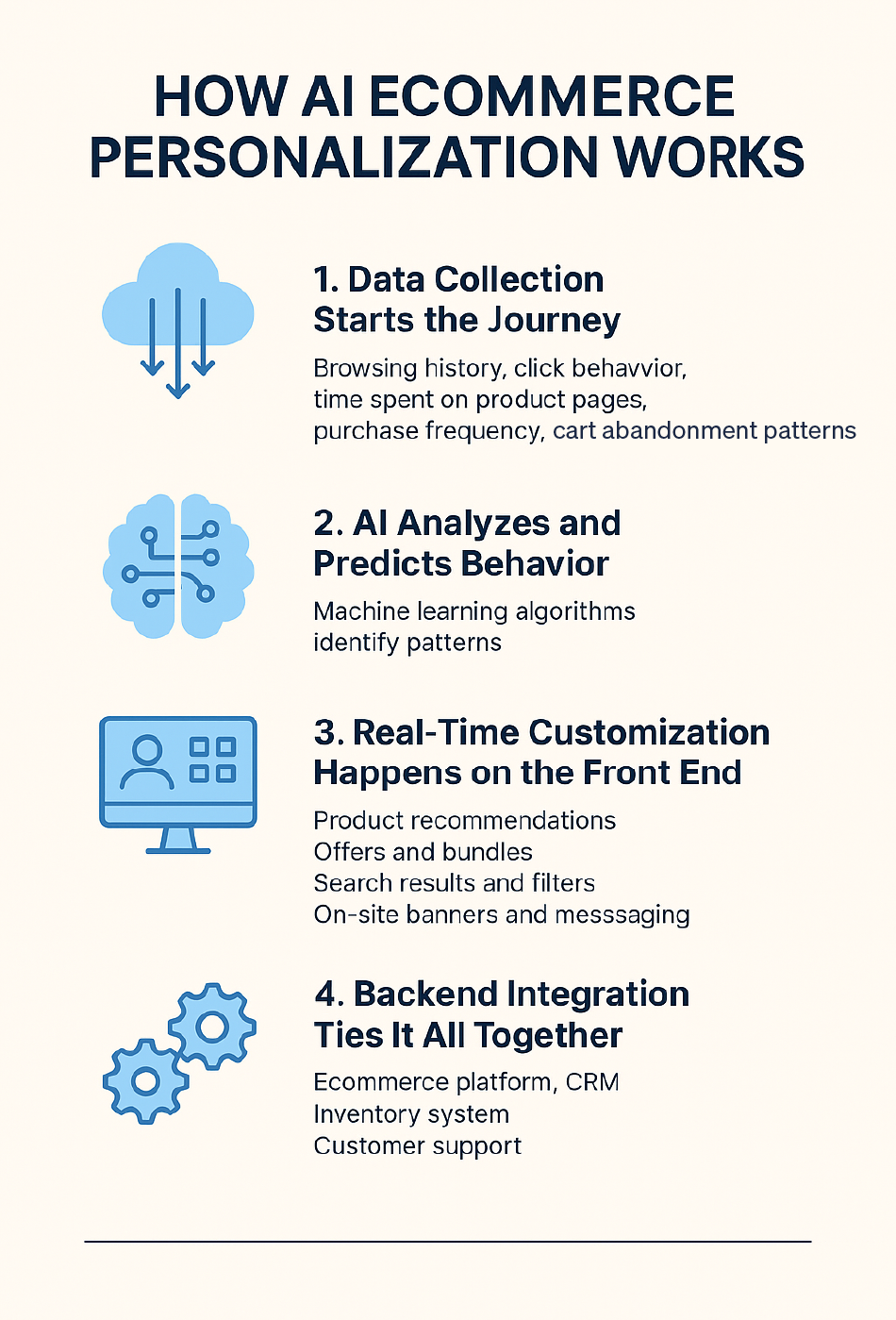
1. Data Collection Starts the Journey
AI begins by gathering signals from multiple touchpoints:
- Browsing history
- Click behavior
- Time spent on product pages
- Purchase frequency
- Cart abandonment patterns
The more users engage, the smarter the system gets.
2. AI Analyzes and Predicts Behavior
Machine learning algorithms scan this data to uncover patterns:
- What do users tend to buy after viewing certain products?
- Who's price-sensitive and who buys based on features?
- Which content leads to conversions?
These insights drive AI ecommerce personalization at scale—with little to no manual effort.
3. Real-Time Customization Happens on the Front End
This is where users feel the impact. AI dynamically adjusts:
- Product recommendations
- Offers and bundles
- Search results and filters
- On-site banners and messaging
All of this happens instantly. No lag, no delay—just smart, timely personalization tailored to each user.
4. Backend Integration Ties It All Together
For AI to truly deliver, it must plug into your ecommerce platform, CRM, inventory system, and customer support stack. That’s where smart implementation comes in.
At Biz4Commerce, we often pair AI personalization with our end-to-end AI integration services, ensuring seamless syncing of customer data, behavior tracking, and dynamic content across every channel.
This isn’t just about guessing what someone might like. It’s about letting AI work behind the scenes to anticipate, adapt, and act—without human delay.
AI Personalization Ecommerce Examples
Let’s move from theory to reality. Here’s how AI ecommerce personalization plays out in real-world shopping experiences—sometimes without customers even realizing it.
1. Personalized Product Recommendations
Ever seen a “You might also like” section that actually felt spot-on? That’s no lucky guess.
AI analyzes your browsing, cart behavior, and past purchases to recommend products in real time. It's smart enough to know when you’re shopping for yourself, versus buying a gift for someone else.
For ecommerce teams, this isn’t just convenience—it’s part of data-driven product management for ecommerce. The goal? Higher conversions and smarter inventory movement.
2. Dynamic Pricing and Promotions
AI can tailor pricing based on user behavior, demand patterns, and purchase intent. For example:
- First-time visitors may see a welcome discount.
- Returning customers might be shown bundle offers based on previous interest.
It’s all about creating the perfect offer at the perfect time—without manual segmentation.
3. Hyper-Personalized Email Campaigns
Gone are the days of “Hi [FirstName], here’s our new stuff.”
AI curates content for each user, suggesting products based on what they actually viewed, abandoned, or added to cart—across devices and channels.
This kind of personalization dramatically boosts open rates and click-throughs—and helps you reconnect with customers who were just one click away from converting.
4. Real-Time Website Customization
Imagine two users land on your homepage:
- One is a frequent buyer.
- The other is a first-timer from a Facebook ad.
With AI, they don’t see the same content. The frequent buyer might get loyalty perks, while the new visitor gets a tailored intro offer. That’s AI personalization in ecommerce doing its thing—adapting layout, banners, CTAs, and even filters on the fly.
These examples show that AI isn’t just powering the backend. It’s actively shaping the user experience—product by product, click by click.
Your AI Assistant Won’t Build Itself—But We Can Help
Let our team of AI and ecommerce experts turn your data into dynamic personalization that converts.
Hire AI ExpertsThe Rise of Generative AI in Ecommerce Personalization
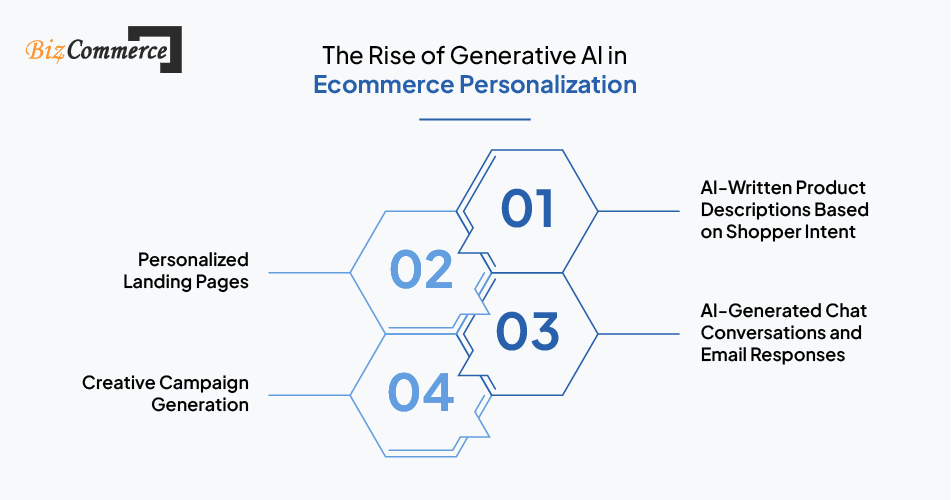
If traditional AI is the brain behind ecommerce personalization, then Generative AI is its voice, designer, and creative director—all rolled into one.
While classic AI models focus on recommendations and behavior prediction, generative AI takes personalization a step further: it can create entirely new content—designed for an audience of one.
Here’s how generative AI ecommerce personalization is evolving the game:
1. AI-Written Product Descriptions Based on Shopper Intent
Why show the same product description to everyone when you can have AI tailor it to match a user's browsing history, tone preference, or location?
Generative AI can rewrite product copy in real-time—making it more persuasive for a price-conscious buyer, more luxurious for a premium shopper, or more technical for B2B customers.
2. Personalized Landing Pages
Imagine an online store that rebuilds its homepage for each visitor.
Generative AI can dynamically create:
- Headlines that match intent
- Featured products based on past behavior
- Offers that match predicted spend level
It’s like A/B testing—but on autopilot and at scale.
3. AI-Generated Chat Conversations and Email Responses
Customer asks about size availability?
Instead of serving a standard message, generative AI can craft a response that’s:
- Brand-aligned
- Context-aware
- Informative and conversion-optimized
Many brands running on a MERN stack ecommerce platform are leveraging generative AI tools for instant, custom content that blends performance with personality.
4. Creative Campaign Generation
Beyond just product suggestions, GenAI tools are now creating entire ad campaigns—from email subject lines to Instagram captions—all tailored to micro-segments of users based on their interests, history, and timing.
In short, gen AI ecommerce personalization isn’t just smarter—it’s more human. It turns your ecommerce store into a living, breathing experience hub that adapts and evolves with every click.
Challenges & Considerations
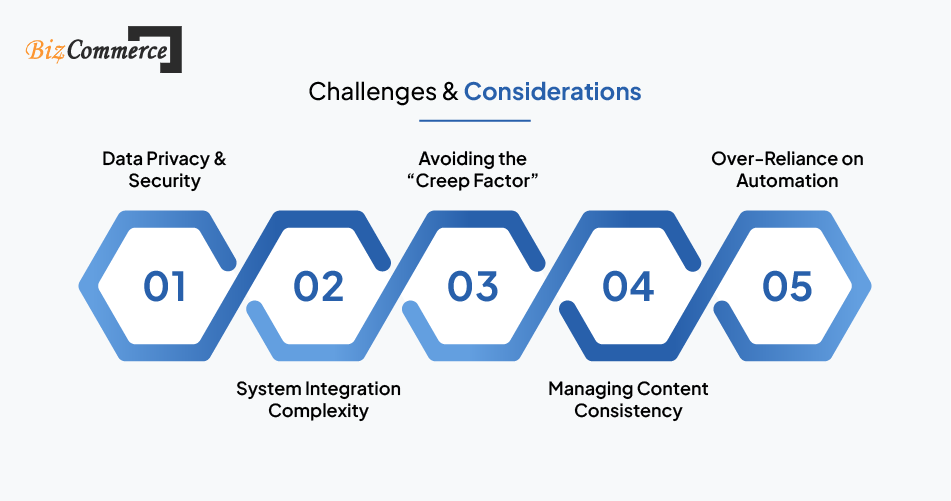
Let’s get real—AI ecommerce personalization is powerful, but it’s not plug-and-play magic. Like any advanced tech, it comes with its own set of challenges that businesses must navigate smartly.
Here’s what you need to consider before you flip the personalization switch:
1. Data Privacy & Security
Personalization depends on data—and that means you’re handling sensitive customer behavior, preferences, and sometimes location data.
Mismanagement can lead to:
- Regulatory issues (hello, GDPR and CCPA)
- Erosion of customer trust
- Potential security vulnerabilities
Strong data governance isn’t optional—it’s foundational.
2. System Integration Complexity
AI needs access to product data, user behavior, CRM, and real-time purchase insights. Connecting these systems can get messy, especially if your tech stack wasn’t built with AI in mind.
Choosing the right tech foundation can make or break your personalization efforts. That’s why it's critical to choose the right stack early on—especially if scalability is part of your growth plan.
3. Avoiding the “Creep Factor”
There’s a fine line between helpful and invasive.
If your personalization feels too personal (“Wait... how did they know that?”), users might disengage. The goal is to be relevant—not intrusive. Striking that balance requires thoughtful design and ongoing optimization.
4. Managing Content Consistency
With AI generating and tailoring content dynamically, brands need to ensure consistency across tone, offers, and messaging—especially across multiple platforms and channels.
A brand selling lifestyle apparel shouldn’t suddenly sound like an accountant just because a new tool wrote the copy.
5. Over-Reliance on Automation
AI is amazing, but it’s not a replacement for strategy or human empathy. Businesses that blindly hand over the reins risk losing touch with their audience.
The smartest approach? AI + human collaboration.
Knowing these challenges helps you plan better and partner smarter—because getting personalization right is less about flashy features, and more about building a resilient, scalable personalization engine that grows with your business.
Personalization That Learns, Adapts, and Sells
We build AI solutions that go beyond product recs—smart, scalable, and fully custom to your brand.
Hire Our AI ExpertsChoosing the Right Ecommerce Personalization AI Solution
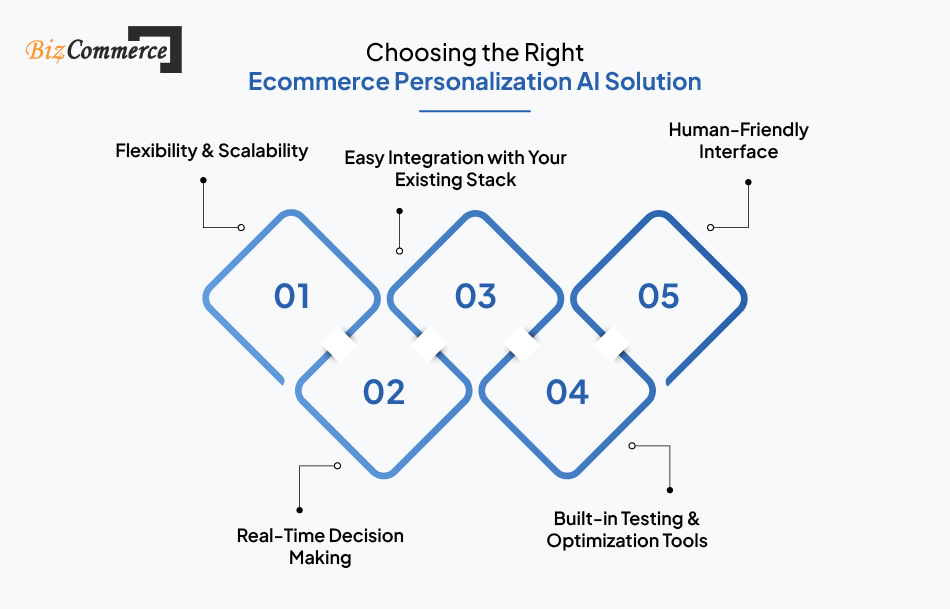
By now, it’s clear that AI ecommerce personalization can do everything from boosting conversions to building loyalty—but not all AI solutions are created equal.
Whether you’re scaling a fast-growing D2C brand or optimizing a multi-channel enterprise, the real question becomes: How do you choose the right AI personalization engine for your store?
Here’s what to consider:
1. Flexibility & Scalability
Your personalization engine should grow with your business. Can it handle:
- Multiple customer segments?
- Thousands of SKUs?
- Different levels of buyer intent and behavior?
If not, it may become a bottleneck rather than a breakthrough.
2. Real-Time Decision Making
Great personalization is responsive, not reactive.
The right solution should adjust:
- Recommendations based on user behavior mid-session
- Offers based on cart activity or exit intent
- Email content based on last interaction timing
Delayed personalization is a missed opportunity.
3. Easy Integration with Your Existing Stack
Your AI engine should plug into your current ecommerce setup—without requiring a total rebuild.
Whether you're on Shopify, Magento, or a custom platform, seamless integration is critical.
That’s why many brands choose partners who not only build the AI logic but also offer end-to-end ecommerce development services to ensure everything runs smoothly—front-end to backend.
4. Built-in Testing & Optimization Tools
Look for platforms that support:
- A/B testing personalized experiences
- Insights dashboards that show what’s working (and what’s not)
- Customer segmentation tools for deeper targeting
Because no AI should ever be “set it and forget it.”
5. Human-Friendly Interface
Your marketing and ecommerce teams should be able to adjust and refine personalization strategies without needing a developer for every change.
Usability matters—especially as personalization becomes part of everyday campaigns.
Bottom line?
The best AI personalization solution is the one that aligns with your tech, scales with your growth, and actually delivers meaningful results—without creating a tech headache.
Why Biz4Commerce?
There’s no shortage of personalization tools out there—but without the right tech partner, even the best AI can fall flat.
At Biz4Commerce, we don’t just integrate AI—we engineer personalization that’s built around your customers, your products, and your revenue goals.
Here’s why ecommerce brands trust us to bring their personalization strategies to life:
1. We Build for Business Goals—Not Just Features
Whether it’s boosting conversion rates, reducing cart abandonment, or increasing AOV, we design AI personalization solutions with one goal in mind: performance.
2. Custom Development with End-to-End Integration
Off-the-shelf tools don’t cut it when your business has unique workflows.
We deliver full-stack solutions—from backend logic to frontend UX—ensuring your AI works seamlessly across channels, platforms, and campaigns.
Looking for real-world results? See how our project with FuelIt used intelligent automation and custom features to drive smarter engagement across the board.
3. Expertise Across AI, Ecommerce & UX
We combine the depth of an AI team with the agility of ecommerce strategists.
From building advanced recommendation engines to integrating real-time personalization into the customer journey—we get it, because we’ve done it.
4. Tech-Stack Agnostic (But Strategy Obsessed)
Working with Shopify, Magento, headless builds, or a fully custom MERN stack ecommerce platform?
We’ve been there, built that—and optimized it.
Whether you’re exploring AI for the first time or looking to scale an existing system, Biz4Commerce is your partner in making personalization actually perform.
Let’s Build Your AI Personalization Engine
You bring the products—we’ll bring the intelligence. Start creating ecommerce experiences that convert.
Schedule a CallFinal Thoughts: Get Personal, or Get Left Behind
Let’s be honest—customers in 2025 don’t just appreciate personalization… they expect it. If your store still treats everyone the same, you're not delivering a great experience—you're delivering a forgettable one.
AI ecommerce personalization empowers you to treat each visitor like a VIP, at scale. And with the right strategy and implementation, it becomes the silent force behind your most critical KPIs: conversions, loyalty, and long-term growth.
But here’s the catch: personalization isn’t something you slap on top of your site. It needs to be woven into your ecosystem—with clean data, seamless integration, and a clear understanding of your customers’ journey.
That’s where Biz4Commerce comes in.
We don’t just deploy AI—we build tailored, intelligent systems that adapt to your business goals, tech stack, and customer expectations. From data architecture to dynamic UX, our team ensures your personalization engine isn’t just smart—it’s revenue-smart.
The question isn’t if you need AI personalization.
It’s how soon you’re ready to turn it on.
FAQ
Q1: Can AI ecommerce personalization work for B2B businesses too?
Absolutely. While B2C often leads the charge, B2B buyers are also expecting tailored experiences—think custom dashboards, reorder suggestions, and dynamic pricing. AI adapts just as effectively for business clients, especially when integrated with existing CRM and ordering systems.
Q2: What kind of data do I need to start using AI for personalization?
At the very least: behavioral data (clicks, views, time on page), purchase history, and basic demographics. The more structured and clean your data, the better the results. Don't worry—platforms like Biz4Commerce help businesses build the right data infrastructure from day one.
Q3: Will AI-generated personalization affect my SEO strategy?
It can, but in a good way. Dynamic content driven by AI can enhance user engagement and lower bounce rates, which are positive SEO signals. Just ensure critical pages have indexable, crawlable content—and that your AI isn’t hiding essential info from search engines.
Q4: Can I A/B test personalized experiences?
Yes—and you should. The best AI personalization platforms offer built-in testing features to evaluate which strategies perform best. You can test everything from product recommendations to content blocks and CTAs to fine-tune performance over time.
Q5: How do I stay compliant with privacy laws while collecting data for AI?
Focus on transparency and consent. Make sure users are aware of what data is being collected and why. Use anonymized data wherever possible, follow GDPR/CCPA standards, and work with partners who prioritize secure and ethical data handling.
